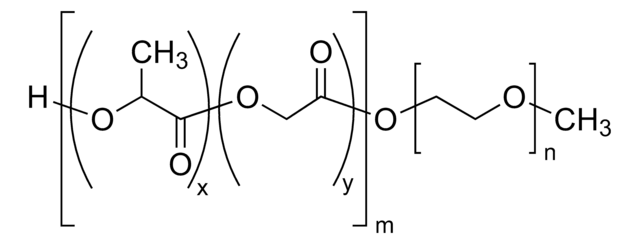764825
Poly(ethylene glycol) methyl ether-block-poly(lactide-co-glycolide)
PEG Mn 2,000, PLGA Mn 4,500
Synonyme(s) :
PEG-PLGA, Polyethylene glycol, mPEG-b-PLGA
Se connecterpour consulter vos tarifs contractuels et ceux de votre entreprise/organisme
About This Item
Formule linéaire :
H[(C3H4O2)x(C2H2O2)y]mO[C2H4O]nCH3
Code UNSPSC :
12162002
Nomenclature NACRES :
NA.23
Produits recommandés
Forme
pellets
Niveau de qualité
Ratio alimentaire
lactide:glycolide 65:35
Poids mol.
PEG Mn 2,000
PLGA Mn 4,500
average Mn 6,500 (total)
Intervalle de dégradation
1-4 weeks
Température de transition
Tm 241-246 °C
PDI
≤2.0
Température de stockage
2-8°C
Vous recherchez des produits similaires ? Visite Guide de comparaison des produits
Description générale
Amphiphilic block copolymers (AmBC) are made up of two chemically different homopolymer blocks. One of the block is hydrophilic and the other one is hydrophobic. These macromolecules have the properties to self-assemble when dissolved in an aqueous media. PEG-PLGA is one the most commonly used biodegradable amphiphilic block copolymers for drug delivery applications. PEG is the hydrophilic part and PLGA is the hydrophobic part.
Application
Used in the synthesis of targeted nanoparticles which are used for differential delivery and controlled release of drugs.
forming "stealth" pegylated microparticles
Caractéristiques et avantages
- Good biocompatibility, low immunogenicity and good degradability.
- Properties can be easily modulated by changing the block copolymer segment sizes to suit a particular application.
Code de la classe de stockage
11 - Combustible Solids
Classe de danger pour l'eau (WGK)
WGK 3
Point d'éclair (°F)
Not applicable
Point d'éclair (°C)
Not applicable
Faites votre choix parmi les versions les plus récentes :
Déjà en possession de ce produit ?
Retrouvez la documentation relative aux produits que vous avez récemment achetés dans la Bibliothèque de documents.
Les clients ont également consulté
Thermosensitive self-assembling block copolymers as drug delivery systems.
Bonacucina, G., Cespi, M., Mencarelli, G., Giorgioni, G., & Palmieri, G. F.
Polymer, 3(2), 779-811 (2011)
PLGA-PEG Encapsulated sitamaquine nanoparticles drug delivery system against Leishmania donovani
Kumara, R., Sahoo, G. C., Pandeya, K., Dasa, V. N. R., Yousuf, M., Ansaria, S. R., & Dasa, P.
Journal of Scientific and Innovative Research, 3(1), 85-90 (2014)
Frank Gu et al.
Proceedings of the National Academy of Sciences of the United States of America, 105(7), 2586-2591 (2008-02-15)
There has been progressively heightened interest in the development of targeted nanoparticles (NPs) for differential delivery and controlled release of drugs. Despite nearly three decades of research, approaches to reproducibly formulate targeted NPs with the optimal biophysicochemical properties have remained
Notre équipe de scientifiques dispose d'une expérience dans tous les secteurs de la recherche, notamment en sciences de la vie, science des matériaux, synthèse chimique, chromatographie, analyse et dans de nombreux autres domaines..
Contacter notre Service technique





